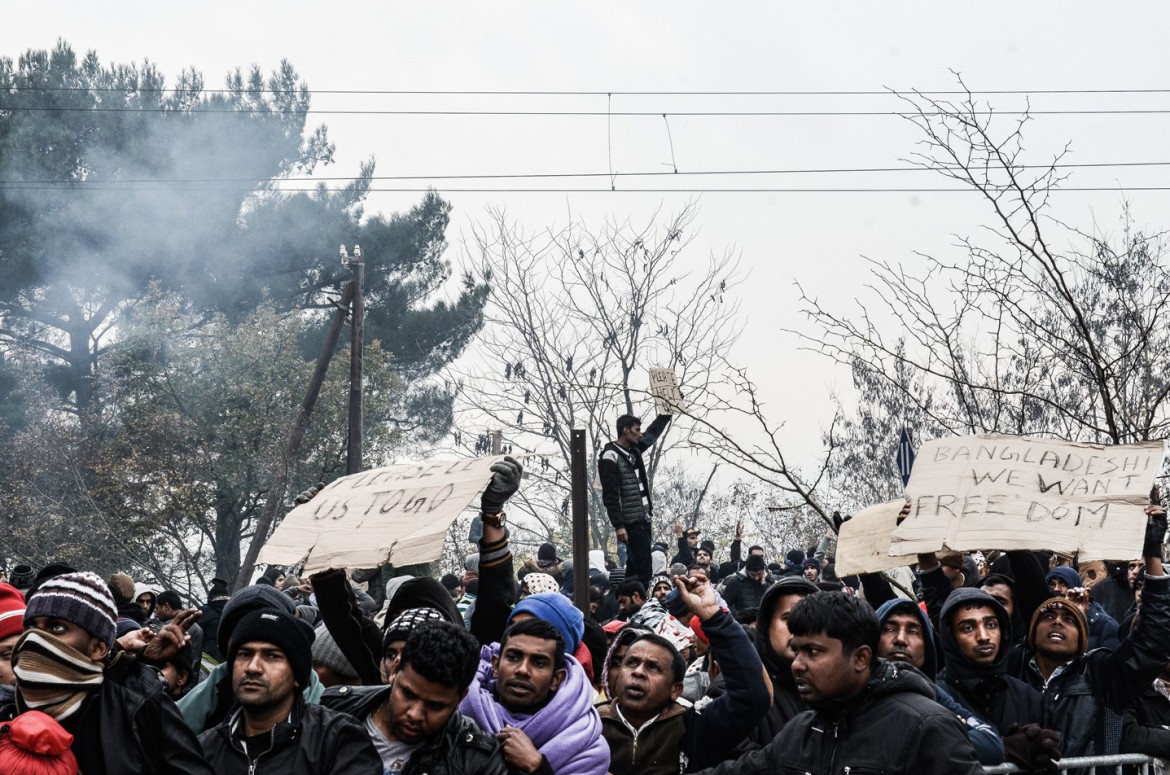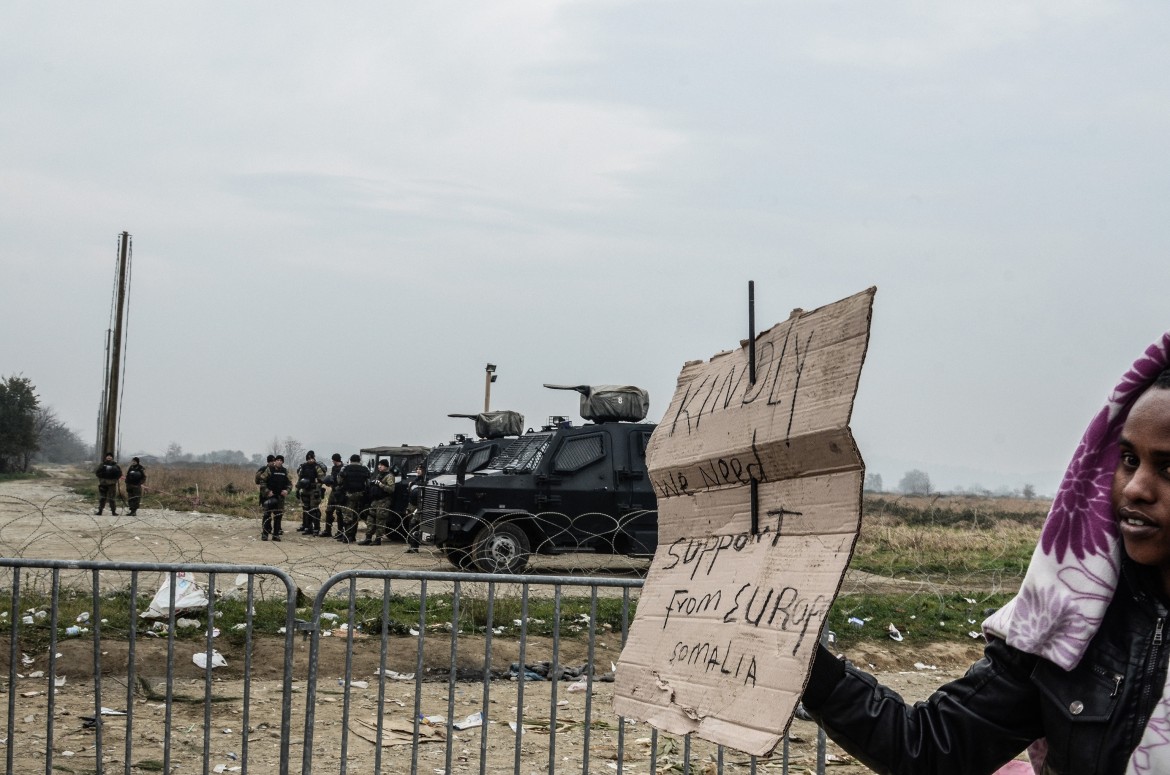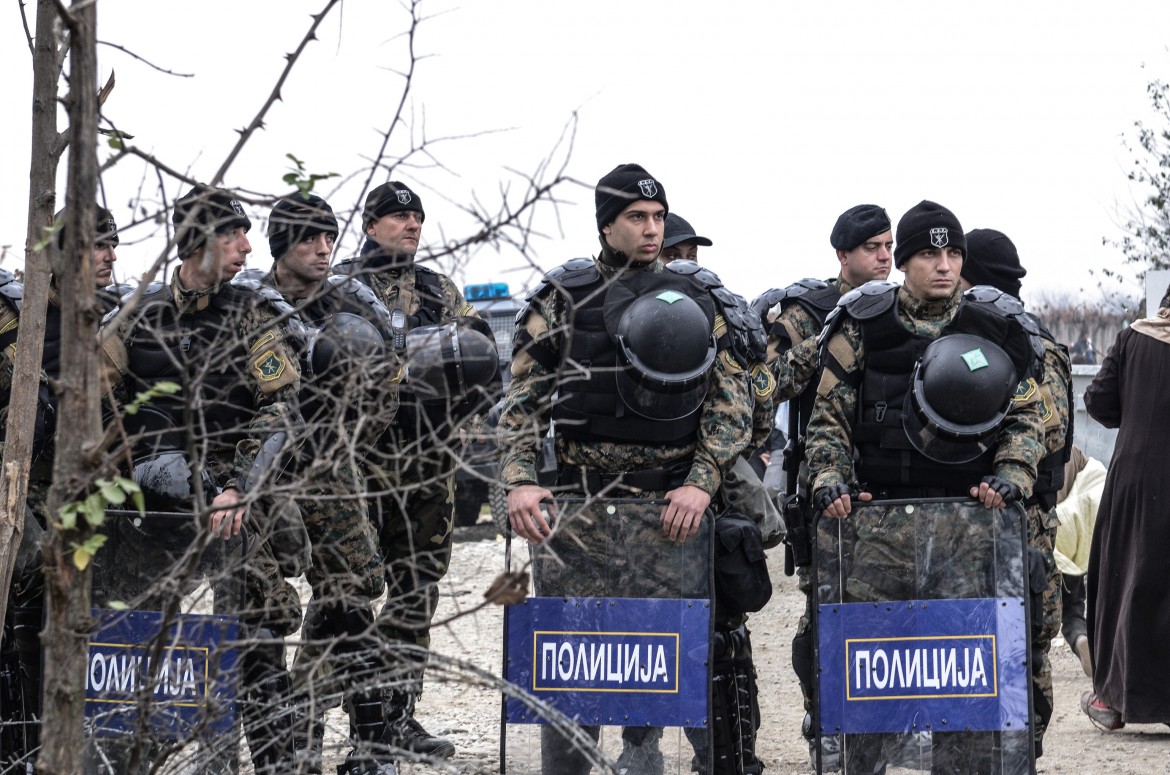Trapped between Macedonia and death
Refugees More than 2,000 refugees and migrants are stranded in the cold at the Greece-Macedonia border as government clench the Balkan route, in violation of international law.
 At the Greek border – Sara Prestianni
At the Greek border – Sara PrestianniRefugees More than 2,000 refugees and migrants are stranded in the cold at the Greece-Macedonia border as government clench the Balkan route, in violation of international law.
More than 2,000 refugees and migrants are waiting to cross the Greek-Macedonian border, blocked from entering by the Macedonian government. Their 30-day visas issued by the Greek government are running out, leaving the possibility that some refugees may be deported back to their countries, where their persecutors await. But if they sneak across the border without an entry stamp, the Macedonians have said they will deport them immediately.
So here they languish, in a dirty no-man’s land of northern Greece, near the village of Idomeni.
This is one of the many joints of the “Balkan corridor” that has seen 600,000 men, women and children cross since the beginning of January. Migrants who land on the Greek islands are obliged to register at identification centers, so-called “hotspots,” where they buy a boat ticket to Athens. From the capital, they leave for Idomeni by bus, then continue toward Macedonia, Serbia, Croatia and Austria.
In recent months, Idomeni was a border post like the others along the Balkan route. Refugees and migrants stood for a few hours, regained their energy and moved on.
But on Nov. 17, after a policy shift in Slovenia, which announced it would only admit Iraqis, Afghans and Syrians, the doors of the Balkan corridor began to close. In a domino effect, Serbia, Croatia and then Macedonia followed suit. Others — Iranians, Bangladeshis, Moroccans, Algerians, Somalis, Eritreans and other Sub-Saharan Africans — are stuck, solely on the discriminatory basis of nationality, with no explanation other than they were born in the wrong place.
No one has given a reason for the change or said how long the border will be closed or if it will ever reopen. Anyone trying to cross the border elsewhere, across forests and rivers, however impervious, risk deportation if they’re found without a Macedonian entry stamp.
The injustice and discrimination materializes as two lines form: On one side are those who can pass, and on the other side, under police guard, are those who cannot. One group can see the other, and the sense of frustration has become palpable.
A Greek police cordon blocks one side of the border and on the other side a more massive wall of Macedonian Army soldiers. Behind them is a row of tanks and barricades. A drone buzzes in the air, filming everything that happens.
As each Syrian, Afghan and Iraqi passes through, the stranded refugees and migrants cry injustice. They chant, “Let us go; we are not terrorists,” and raise signs demanding the opening of borders and the right to move freely. In the last two days, the demonstrations were peaceful, but the volunteers warn that it wouldn’t take much before the authorities start shooting tear gas.
The professor
A.R. is Iranian, and in perfect English he tells me he’s a university professor. He had a house and status, and lived a life of wealth in Tehran. “If I left, there is a reason,” he says. “If I risked my life in a boat in the Aegean Sea, taking with me my pregnant wife and my children, it’s not because I want to come and work in Europe. I cannot go back to Iran and risk their lives.”
Though Macedonia is not a signatory to the 1951 Refugee Convention, its policy is a violation of international law, which guarantees asylum seekers an analysis of their personal stories to determine their refugee status.
No one has asked A.R. to explain why he is in danger. The police merely consider him an economic migrant and leave him in limbo, waiting in the cold and in ignorance to find out what his fate will be.
“They told me I could decide to wait here or go back to Athens,” he said angrily. “But I cannot go back.” Saturday morning, a group of Iranians began a hunger strike to demand that the borders be opened. At least one of them sewed his lips together with nylon string.
The living conditions, despite the efforts of various volunteers, remain difficult. They sleep in tents or under awnings in the open. Inside one tent is a group of Africans of various nationalities: Cameroon, Mali, Togo.
I see a group of Eritreans. They decided not to take the Libyan path because they were too afraid of the sea. They knew too many of their compatriots who were swallowed by the Mediterranean. To Macedonia’s government, it doesn’t matter that, as Eritreans, there is a strong likelihood they’re fleeing persecution and are entitled to seek asylum; the Macedonians just know they are neither Syrian, Iraqi nor Afghan. There are rumors now that even Afghans will be blocked, the next on the list of unwanted nationalities.
During the day, those who don’t want to protest at the border gates wrap themselves in blankets and roam between the train tracks and the fires built to withstand a climate that’s becoming more and more frigid. They ask over and over when the border will open, like a mantra, even though they know that no one has a definite answer.
A large group of young Bangladeshis warm themselves around a fire, which also serves to illuminate the darkness that falls on Idomeni tonight. They tell me about how they almost died in the Aegean Sea. Their raft deflated and sank. The traffickers had given them a bad boat. They sold everything to go: more than €2,000 to get from India to Iran, then to Turkey and now Greece — and now they are stuck.
One of them excitedly tells me that if he is sent back he will be killed. Besides, he lost everything and cannot go back. He keeps asking, “When the border open? My friends from Bangladesh last month passed without problems.” It’s difficult to explain the mechanisms of the geopolitical chessboard of Europe, where migrants are pawns on a Risk board, where borders are opened and closed without notice, where the lives of hundreds of people can be suspended in time or returned to sender, in violation of international conventions.
Stop arrivals
The number of migrants stranded at the border, however, remains constant. Strangely, no boats arrived yesterday in Athens. It was the first time in months. No boats or rafts reached the islands from the Turkish coast, either. If the number of arrivals has slightly decreased in the last two weeks, it’s not because fewer people are fleeing. The quiet could be linked to the weather, given the wintry storm moving across the region. In that case, when the wind stops blowing, other boats will arrive, and the number of migrants stuck in Idomeni limbo will continue to grow.
But it could also be a consequence of Turkey’s decision to cooperate in stopping migrants, as requested by the E.U. Recent reports by Human Rights Watch tell of raids along the Turkish coast, which could be closely linked to the calm in the sea. If that’s the case, it would be even more tragic: Thousands of people would be forced into a country, Turkey, whose hospitality is wearing thin. The country does not recognize the rights of refugees, and carving out a life there — considering the two million refugees already present — is almost impossible.
Meanwhile, Idomeni is preparing for more immigrants, and UNHCR has built another camp there, close to the existing one. The warren of tents grows every day. Passing between the rows of curtains, you can hear songs in dozens of languages. The frustration and waiting. The hourglass on their 30-day visas is running out of sand. When it expires, they can be detained and deported at any time.
They count the days and hope that tomorrow is the one in which states agree to open the border and let them pass into yet another unknown.
–> Originally published in Italian at il manifesto on Nov. 24 2015

I consigli di mema
Gli articoli dall'Archivio per approfondire questo argomento
